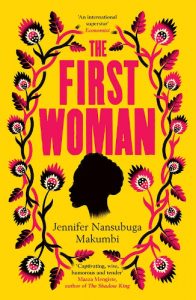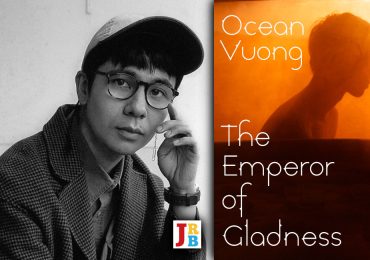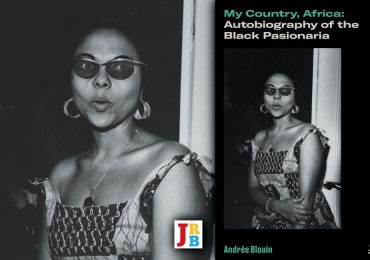The First Woman can be read as Jennifer Nansubuga Makumbi’s answer to people who like to defend patriarchal power by claiming that feminism is ‘not African’, writes Itumeleng Molefi.

The First Woman
Jennifer Nansubuga Makumbi
Oneworld, 2020
‘You know, they straightened out the Mississippi River in places, to make room for houses and liveable acreage. Occasionally the river floods these places. “Floods” is the word they use, but in fact it is not flooding; it is remembering. Remembering where it used to be. All water has a perfect memory and is forever trying to get back to where it was. Writers are like that: like water, I remember where I was before I was straightened out.’—Toni Morrison, ‘The Site of Memory’
‘Wow! Oh my days! That can sum up my book! Wow!’—Jennifer Nansubuga Makumbi’s reaction when author Tayari Jones read Morrison’s quote in relation to her book.
1.
I happen to live in the hostel of the high school where I teach, in the Karoo. Following the national lockdown as a result of the Covid-19 pandemic, our learners were phased back to school (and to the hostel) according to their grades.
Every morning, as the learners file out to go to school, they are screened at the door. One morning, a few weeks ago, I was heading out to school and found the usual queue of learners. However, this morning the line was not moving as quickly as it usually does. As I rounded the corner, I found that the source of this was a fourteen-year-old girl in grade nine, who I had taught the previous year.
The hostel superintendent was berating her for the way she looked. The school colours are maroon, white and gold, but she had decided to spice up her school uniform with different-coloured clothing.
‘You know you are not supposed to wear those shoes and those socks,’ the superintendent was saying to her, as he sprayed hand-sanitiser on her cupped hands. A pair of white secret socks peeked out from the girl’s black Vans sneakers.
‘I’m sorry, meneer,’ the girl responded. ‘I—’
‘And that jacket as well!’ Over her crisp-white school shirt she had a black fleece jacket on to protect against the morning chill.
‘I forgot my school shoes at home.’
‘You must not wear those secret socks again—’
‘Yes, meneer,’ this comes out curtly. She did not mean to interrupt him: she was being so short with him because she knew that the longer this exchange took, the more likely it would be that meneer would force her to go and change.
The shoes, jacket and socks made the girl’s uniform more fashionable; they added touches of individuality. She was no different from the many boys at school who take chances by adding an item of clothing for the same reasons. But the boys usually get away with it.
‘You’re a girl: you have to look decent.’
‘It won’t happen again, meneer.’
As I walked away, I was reminded of the hero of Jennifer Nansubuga Makumbi’s second novel, The First Woman (published as A Girl is a Body of Water in North America). At one point, this hero, Kirabo, is told to ‘Sit properly!’ and the following scene unfolds:
‘Hffm.’ A boy turned his head away, fanning his scrunched-up nose as if the smell from between her legs was killing him.
‘Thu,’ another dry-spat. ‘She is twelve, but we still remind her.’
Kirabo tightened her legs.
‘Kirabo,’—Gayi’s voice was soft—’you cannot sit like men. Always kneel. You will not offend anyone that way.’ [Emphasis added]
This policing of women’s behaviour and looks from a young age is just one of the many familiar issues that Makumbi tackles deftly in her triumph of a novel.
2.
In August 2018, Makumbi visited Wits University’s Humanities Graduate Centre. She had a conversation with the then-head of the African Literature Department, Danai Mupotsa, about her acclaimed debut novel, Kintu. When Mupotsa mentioned that Kintu can be read as a feminist text, Makumbi laughed this off and said that every time people tell her that, she responds that for her it is a masculine text, mainly because only one of its five point-of-view characters is a woman. Earlier this year, Makumbi made the same assertion at the online literary festival Afrolit Sans Frontières, in her conversation with Troy Onyango:
Every time people say [that Kintu] is a feminist novel, I say—You have no idea what I gave up to have those men stand out. Just wait until you read my second novel.
If we are to accept Makumbi’s assertion that Kintu is a masculine text because it centres male voices and narratives, then perhaps The First Woman is Makumbi’s answer to people who defend patriarchal power by claiming that feminism is ‘not African’.
The First Woman centres around Kirabo’s coming of age. She is a young girl living in Uganda during the nineteen-seventies and eighties. When we first meet her, she is twelve years old and living with her doting grandparents. The opening paragraphs of the book have us witness Kirabo’s burgeoning longing for her absent mother. She is also starting to realise that she has a ‘second self’, who not only makes her do bad things, but also occasionally goes flying out of her body. This second self scares her, and she thinks it is part of the reason her mother did not want to be in her life.
Since no one in her family is willing to tell her about her mother, Kirabo makes up her mind to get help from the local witch: an old, blind woman named Nsuuta. Nsuuta agrees to help Kirabo with both her problems: she promises that she will make contact with Kirabo’s mother, and informs her that her ‘second self’ is actually the ‘original state’ of women, reborn inside Kirabo. Much of the first part of the book has Kirabo visiting Nsuuta repeatedly, and during these visits the old woman tells the little girl the story of ancient humans in an attempt to convince her to hold on to this ‘original state’.
In one of these stories, Nsuuta tells Kirabo that ancient humans first created stories to justify human domination of the land, plants and animals. Later, these ancients created stories to oppress and denigrate women. The ancients, she explains, saw the universe as divided into four realms, heaven, the underworld, the sea, and land:
‘Heaven was for the gods, yes?’
‘Yes.’
‘The underworld is where the dead begin a new life, yes?’
‘Yes’
‘If land belonged to man, what is left?’
‘The sea,’ Kirabo answered.
‘Ah haa. The sea, the ancients claimed, was woman’s realm.’
‘What? Women belonged in water?’
‘And if they did, they could not share in land wealth, could they? “If you want property,” they told the women ancients, “go back to your sea and grab to your heart’s content.”’
This layered tale is a demonstration that stories do not exist solely for the sake of entertainment. The First Woman is reflective of this: the novel shows us that stories wield immense power: they can be used to uplift or to oppress, to humiliate or to glorify, to instil fear or to inspire courage. And the most powerful stories have helped human beings come together and build the modern world as we know it.
The story is also a dense microcosm of The First Woman itself. Both speak to the everyday lived experiences of women across the continent, who do what they can to create nuanced ways of being, challenging tropes and stereotypes about who they should be. This is feminism of a kind that Makumbi says is not concerned with ‘theorising [about] and holding conferences’ for.
In her conversation with American novelist Tayari Jones (author of An American Marriage) for the independent bookstore Powell’s Books, Makumbi said:
Let’s go back to our grandmothers’ feminism. The word was not ‘feminism’, the word was ‘mwenkanonkano’. So let’s start there. But we are not going to start where Europe started, with “This is what they do to us and this is what we want.” The traditional, indigenous feminism takes you back to the moment the first woman was suppressed. And how did they do it? Why did they do it? And when did women join in in their own oppression and how come are we perpetuating it? Because understanding all of that then helps us to find ways of undoing it.
Makumbi explores the oppression of women by other women through Kirabo’s relationship with her best friend Giibwa, which illustrates the intersections of sexism, colourism and classism, and the impact that these intersections have on the solidarity that can exist between Black women. Kirabo’s grandfather owns the land on which Giibwa’s father is a labourer, and from a young age both girls are acutely aware of their class positions. As they grow older, Kirabo’s privilege affords her a better education, and her inheritance from her grandparents not only secures her future, but also creates an unbridgeable valley between her and Giibwa.
This is something that Makumbi spoke to Jones about as well:
In Uganda, when women acquire a certain level of independence—this comes from being educated, from owning property, from getting jobs—when women have that, they always abandon the maternal and the domestic spaces. So as soon as they have their children, they’re going to bring in a nanny to look after the children, […] a servant to look after the house. And this is the major problem in Uganda: those women who are working for these middle-class women, they see them as men. […] They are leaving what they should be doing—as far as these women are concerned—and they are employing them and then they treat them exactly the way men treat women. And so when a middle-class woman goes to a working-class woman and says, ‘Oh fellow woman, let’s do feminism’, they are like, ‘No, we’re not all equally women. You’re men.’
Makumbi demonstrates this point vividly towards the end of her novel, when Kirabo and Giibwa confront each other. Kirabo is seeking to meet Giibwa halfway, and invokes a proverb that she used to hear from her grandmother:
‘Giibwa, we grew up together, I know your world, you know mine. My grandmother says, “You see these fingers”—Kirabo held up her hand—“they are not the same but they work together.”’
‘That is an interesting one coming from you, Kirabo. Especially as the four female fingers are not equal to the male one, which rules the hand. But for me the problem is not that the male finger rules the hand; it is the fact that the four female ones are not equal.’
The lack of solidarity between women as a result of the fissures caused by different kinds of oppression is something that Egyptian–American journalist and author Mona Eltahawy discusses in her second book, The Seven Necessary Sins for Women and Girls. During her discussion with Natasha Omokhodion-Kalulu Banda for the second season of Afrolit Sans Frontières, Eltahawy explained her understanding of patriarchy as follows:
‘When I talk about patriarchy, I want you to imagine an octopus. The head of the octopus is patriarchy, because patriarchy—I believe—is universal […] Each one of the tentacles is an oppression, because patriarchy is a system of oppressions that privileges male dominance […] Each one of those tentacles is obviously going to be different according to where you live, but they all serve the head of the octopus: patriarchy. So, in the United States, for example, one tentacle would be white supremacy. In another country it will be racism of another form. Another tentacle will be capitalism and classism. Another tentacle would be misogyny. Another tentacle is homophobia. Another is transphobia. Another is bigotry based on religion. Another is ableism. […] Another tentacle would be ageism. […] Patriarchy is the octopus. It uses the tentacles: each one is a form of oppression. And all of this is for the sake of male dominance.’
Makumbi makes this point repeatedly in The First Woman, through the interactions of her characters and through the many oral stories that are related in the book. One of these stories, told by twelve-year-old Kirabo, appears in the opening chapter of the novel. Luzze and his first wife, she says, had many children and they were all girls. Because he desperately wanted a son, Luzze married a second wife, but she also only gave birth to daughters. When his third wife also only had girl-children, Luzze gave his three wives an ultimatum: ‘“From today onwards, if you, or you or you”—he jabbed a finger at each woman—“bear me another girl, don’t bring her home.”’
The first two wives had daughters once more and Luzze threw them out. The third wife had twins: a boy and a girl. She hid the girl in an anthill and took the boy back to Luzze. The daughter grew up in the anthill, and eventually was discovered by the entire community. Everyone—women, men and children—all blamed Luzze’s wife for being so cruel. One of the men says the following:
Women, […] the way they seem so weak and helpless and you feel sorry for them. But I am telling you, beneath that helplessness they are deep; a dangerous depth without a bottom.’ He nailed the words into a fist with an open palm. ‘You live with them, love them and have children with them, thinking they are fellow humans, but I am telling you, you know nothing.
Some of women are heard saying:
‘A whole woman—hmm? With breasts—hmm? To bury her own child in an anthill?’
‘She is no woman, that one—she is an animal.’
‘It is such women who make us all look bad.’
‘And you wonder why the world thinks we are all evil.’
It is Luzze’s wife who is demonised for what she did—not Luzze. All the responsibility for what happened to his daughter is laid at her feet. There is no accountability at all for Luzze himself. With this story, Makumbi demonstrates to us clearly how so much is done by men and women alike to uphold the patriarchal status quo.
It took Makumbi twenty years to get The First Woman published; during that time she revised it numerous times, and this is evident in the beauty of the writing. Her prose feels like a warm embrace from a favourite grandparent: its love is unconditional, it is invested in nothing but the best for you, and wants nothing more than to spoil you rotten.
At its core, The First Woman is about storytelling. Not just the stories we tell to others, but the stories we tell ourselves, how we tell these stories and how they impact our place in the world. Makumbi demonstrates to us that stories are not just stories: they are powerful entities that build and shape our existence at each moment of every day.
- Itumeleng Molefi is a science educator, part-time freelance writer and moonlighting YouTuber. When not performing for his learners in his classroom, he writes and produces video-essays on African literature with his team for the YouTube channel BOTLHALE. Molefi’s nonfiction has appeared in Business Day, Mail & Guardian and Sunday Times, and his fiction has appeared in Botsoto and Kalahari review. Follow him on Twitter.





